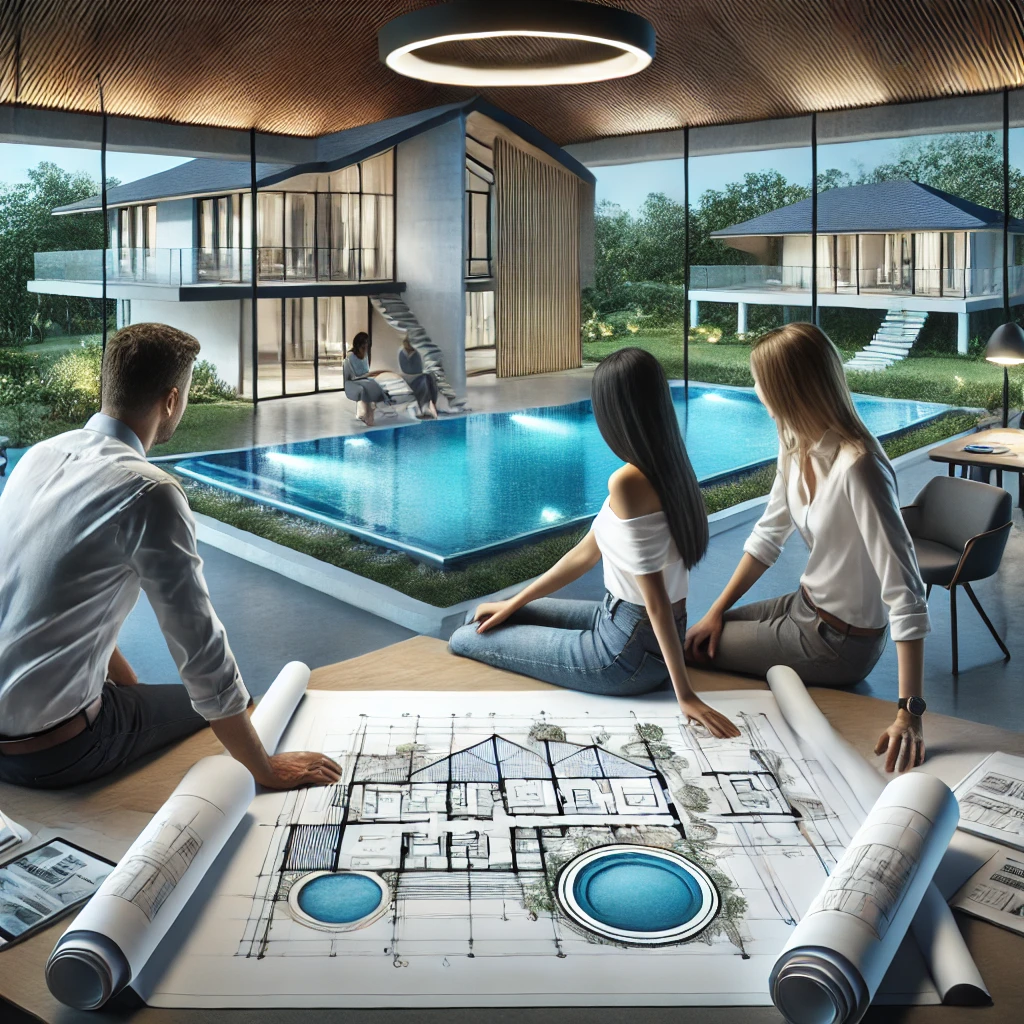Plan Your Home & Pool Together: The Ultimate Step-by-Step Guide
If you’re designing or building your new home, now is the perfect time to add pool pre-construction planning. By integrating your pool project early, you can coordinate permits, site layout, infrastructure, and design with your home build—saving time and avoiding costly adjustments later.

Step 1: Define Your Goals & Budget
Choose Your Pool Type:
– In-Ground: Permanent, fully customizable (shape, depth, finishes).
– Above-Ground: More affordable and faster to install, ideal for smaller spaces.
Budget Estimates (Rough Ranges):
– Above-Ground: $3,000–$10,000
– In-Ground: $20,000–$70,000+ (varies with size, materials, and features)
Consider Long-Term Costs:
– Energy & Equipment: Filtration, heating systems ($2,000–$5,000)
– Maintenance: Chemicals, routine upkeep ($1,000–$2,500 annually)
Resources:
Step 2: Research Local Regulations
Understand Local Codes & Permits:
– Every state and province has its own building codes, safety standards, and permit requirements.
– Permit fees typically range from $100 to $1,000 depending on your location.
Where to Verify:
– USA: Visit your local city or county building department website.
– Canada: Check with your municipal or provincial office.
– Tip: Call local authorities or consult a local professional if rules seem complex.
Resources: “Navigating Local Building Permits →”
Step 3: Detailed Design & Planning
Create a Comprehensive Design:
– Define your pool’s dimensions, shape, depth, and location on your property.
– Select materials such as concrete, fiberglass, or vinyl liners.
– Plan the infrastructure by mapping out plumbing routes, electrical wiring, and lighting placements.
Engage Professionals:
– A designer or architect can produce professional drawings (cost: a few hundred to over $1,000) for accuracy.
Plan Extra Features:
– Consider waterfalls, built-in seating, smart water analyzers, and custom lighting.
Resources:
Step 4: Consult with Professionals
Identify Key Experts:
– Pool Contractor: Get at least 3 detailed quotes and verify licenses and insurance.
– Engineers: Civil/structural engineers assess site conditions, especially in challenging soils.
– Electricians & Plumbers: Ensure safe, code-compliant installation of systems.
– Landscape Architects: Integrate pool design with surrounding outdoor spaces.
Due Diligence:
– Check credentials, customer testimonials, and past project portfolios.
– Draft a detailed contract covering scope, timeline, and payment milestones.
Resources: “Find A Pool Professional →”
Step 5: Submit Permits & Complete Paperwork
Assemble Your Documentation:
– Detailed design plans, contractor quotes, and any necessary site assessments (e.g., soil tests).
Submit Permits:
– File your permit application with your local building department. Approval timelines typically range from a few weeks to a couple of months.
Resources:
Step 6: Construction Phase
A. Site Preparation & Earthworks:
– Site Clearing: Mark the pool area accurately and clear any obstacles.
– Excavation: Perform excavation and ground leveling.
Cost Note: Typically $50–$150 per cubic yard, depending on soil conditions.
– Soil Considerations: For rocky or clay soils, plan for additional drainage or reinforcement.
B. Structural Build:
– Pool Shell Construction: Build the structure using concrete, fiberglass, or another method. Waterproof and finish the interior surface.
Material Costs: Finishing (tiling, plaster, etc.) can add $10–$15 per square foot.
C. Systems Installation:
– Plumbing & Filtration: Install essential plumbing and a quality filtration system ($2,000–$5,000).
– Electrical Work: Set up safe electrical connections for pumps, lighting, and heating.
Resources:
Step 7: Finishing Touches
Interior Finishing:
– Choose your pool lining (plaster, tile, or vinyl) and install coping around the perimeter.
Final Inspections:
– Schedule a final walkthrough with local inspectors to ensure all codes are met.
Resources: “Find A Pool Inspector →”
Step 8: Equipment & Safety Features
Essential Equipment:
– Pool Cover: $500–$2,000
– Cleaning Systems: Robotic cleaners (around $1,000)
– Safety Measures: Alarms, barriers, or fencing ($1,000–$5,000)
Smart Integrations:
– Options for automated water quality monitoring and home automation integration.
Insurance:
– Update your homeowner’s policy to cover pool liability and structural risks (typically an extra $50–$150 per year).
Resources: “Get Insurance →”
Step 9: Final Checks & Ongoing Maintenance
Post-Construction Walkthrough:
– Verify that all systems (filtration, plumbing, electrical) are working properly and obtain final inspector approval.
Develop a Maintenance Plan:
– Establish a routine for cleaning, chemical balancing, and equipment checks.
– Annual maintenance typically costs $1,000–$2,500.
Resources:
Step 10: Taxes & Long-Term Considerations
Impact on Property Taxes:
– A new pool can raise your property’s assessed value. Check with your local assessor for details.
Future Upgrades:
– Budget for energy-efficient systems and smart upgrades to lower long-term operational costs.
Summary
1. Integrated Planning: Early pool pre-construction planning ensures a seamless integration with your home build, saving time and avoiding costly changes.
2. Detailed Steps: From defining your goals and budget to consulting professionals and planning maintenance, every step is crucial for success.
3. Local Expertise: Always verify local regulations, permits, and tax implications with your local authorities to tailor your project to your area.
Integrating pool pre-construction planning with your home build creates a harmonious, efficient, and cost-effective project. Follow this guide to transform your outdoor space with confidence.





